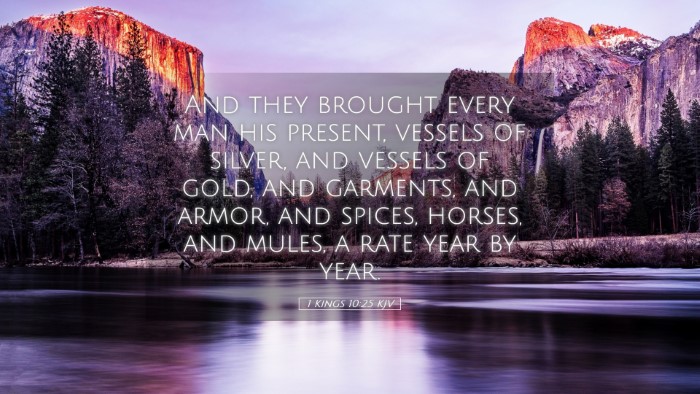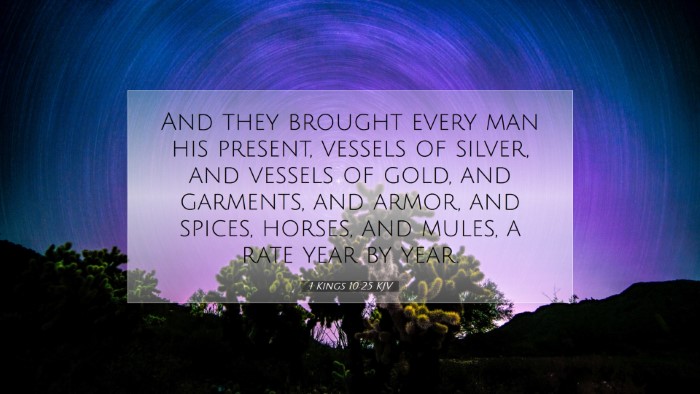Commentary on 1 Kings 10:25
Verse: "And they brought every man his present, vessels of silver, and vessels of gold, and garments, and armor, and spices, horses, and mules, a rate year by year." (1 Kings 10:25)
Introductory Thoughts
This passage from 1 Kings 10:25 reflects the grandeur and wealth associated with King Solomon's reign. The act of tribute brought by various nations to Solomon demonstrates the recognition of his wisdom, power, and the prosperity he had achieved. In understanding this verse, we will draw insights from noted commentators such as Matthew Henry, Albert Barnes, and Adam Clarke.
The Context of the Verse
1 Kings 10 describes the visit of the Queen of Sheba, who came to test Solomon with hard questions and to witness his fame. The verse serves as a conclusion to her visit, depicting the gifts presented to Solomon, emphasizing both his wealth and influence in the ancient world.
Commentary Insights
Matthew Henry's Observations
Matthew Henry comments on the significance of the gifts brought by the visitors. He notes that:
- Tribute as Recognition: The gifts symbolize recognition of Solomon's wisdom and governance. In ancient cultures, presenting gifts was a gesture of respect and allegiance.
- The Nature of the Gifts: Henry elaborates on the variety of gifts (silver, gold, garments, spices, and animals) as representative of the wealth of the nations and their desire to establish favorable relations with Solomon.
- Regular Tribute: The phrase "a rate year by year" suggests that Solomon's influence was long-lasting. They did not only visit once but returned regularly, indicating a tribute system where subjects acknowledged Solomon's sovereignty.
Albert Barnes' Insights
Albert Barnes takes a detailed look at the verse, highlighting several key points:
- The Political Implications: Barnes indicates that such tributes are commonly understood as a way for neighboring nations to maintain peace and gain favor, emphasizing the diplomatic significance of Solomon's reign.
- The Diversity of the Gifts: He points out that the gifts encompassed various useful items, which showcases the breadth of trade and production cultivated during Solomon’s rule, further enhancing the splendor of his kingdom.
- Spiritual Application: Barnes also draws a parallel to spiritual gifts believers bring before God, suggesting that just as earthly kings receive tribute, God also receives offerings that reflect our gratitude and acknowledgment of His sovereignty.
Adam Clarke's Commentary
Adam Clarke provides a comprehensive view, touching on various aspects:
- Historical Context: Clarke elaborates on the historical backdrop, mentioning how the wealth brought to Solomon was unprecedented and served to establish his empire's prominence.
- Cultural Significance: Each type of gift—silver, gold, and horses—holds cultural meaning, showing what nations valued at the time. The diversity and quantity indicate Solomon’s role in international commerce.
- Symbolic Interpretation: He interprets the gifts as symbols of godly blessing upon Solomon, suggesting that his wealth and the tribute of nations can serve as a metaphor for the spiritual richness that God bestows upon His people.
Theological Reflections
This verse, while historical, opens theological reflections relevant to contemporary faith:
- The Nature of Kingship: Solomon’s kingship exemplifies the ideal king influenced by divine wisdom. This points to Christ as the ultimate King who receives homage from all nations.
- Gifts and Offerings to God: The principle of giving physical gifts as offerings toward greater goals (e.g., building the Temple) illustrates the importance of reflecting on what we bring to God in our lives — time, talents, resources.
- The Call for Humility: Even as nations recognized Solomon's power, believers are reminded of God's ultimate authority and the need for humility in both leadership and service.
Conclusion
1 Kings 10:25 is not merely a historical account of tributes but an exploration of the implications of kingship, wealth, and divine favor. The insights from Matthew Henry, Albert Barnes, and Adam Clarke combine to form a rich tapestry of understanding that is valuable for pastors, students, theologians, and scholars seeking to grasp the multifaceted meaning of scripture. As we reflect on this verse, let it inspire us towards acknowledging God’s supreme reign and the ways we can offer ourselves as living sacrifices in homage to Him.


